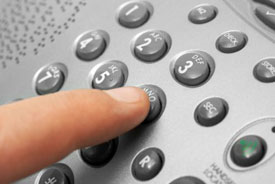Time Management Tips for Cold Calling Inside Sales Reps
 Over the years, I found that I innately gravitate towards the part of my job I enjoy doing the most. I think we're all guilty of that at times. In fact, I would argue that most of us gravitate away from cold calling. In my experience it has been rare to see someone swan dive into cold dials every day. Generally, I had a pre-calling ritual before I got going, but there were still days when it seemed as if it took me an entire morning to get warmed up.
Over the years, I found that I innately gravitate towards the part of my job I enjoy doing the most. I think we're all guilty of that at times. In fact, I would argue that most of us gravitate away from cold calling. In my experience it has been rare to see someone swan dive into cold dials every day. Generally, I had a pre-calling ritual before I got going, but there were still days when it seemed as if it took me an entire morning to get warmed up.
Those of us who dial for dollars understand those days where it feels like the phone weighs about 150 pounds and it was nearly impossible to get into any kind of rhythm. I know when I wasn’t in “the flow,” I typically would find any excuse not to make a call, but any good inside sales rep understands that, as much as we try to put cold calling off for later, it's always going to be a requirement of the job.
Most of the outside sales reps I've supported in the past never really had a call plan. Generally, it consisted of an erratic combination of cold dials sprinkled in with a couple emails for good measure, with no real science to back it up. Not only that, but this was crammed in while filling out the expense report, finishing up a proposal and doing a discovery call with a new prospect. Contrast this against the small percentage of inside sales reps I've worked who would typically allocate a few set hours to making the necessary dials. Usually that consisted of a morning and afternoon session. They noted that having a focused couple of hours meant a huge increase in the amount of dials that went out in the course of a day. If they just did it piecemeal, their unfocused effort usually netted about a 50% lower call output. Bottom line is that you need to carve out the time. Put it on your calendar so you don't have an excuse and just do it.
This is the mindset I want to see in my inside sales team as they take to the phones. Granted, they are tasked with calling all day long, but the road blocks that prevent them from being consistently productive do exist. You need at least 4 hours in your day where you’re doing nothing but dialing. The key thing is to set your day up accordingly.
Realistically, most of us work in an environment with constant distraction. Let's paint the picture on typical Monday: Joanie will come by to ask a business-related question that leads into what happened over her zany weekend. After 15 minutes of her yammering on, you attempt to get off the ground and a email pops up from a prospect that you must read. Then as you are about to dial you decide to quickly brush up on the latest news on your prospect... Before you know it, it's 20 minutes later and you haven’t even made the call yet.
While these are all things we deal with throughout the day, they can be addressed pretty simply. If you know that Joanie generally tends to yammer, then leave your head-set on, or the office door shut, to indicate that you do not wish to be disturbed. To avoid reading email, shut Outlook/Gmail down during the calling session, or at the very least remove the email pop-up notification. Research as we all know is absolutely necessary, but rather than reading that interesting article on your target company during prime calling hours, set the research aside for the first or last half hour of your day.
Here are a few other things I would suggest to allow for more efficiency:
- Have your email templates pre-written depending on the interest level of the prospect. Leave the customized email writing for after your call session
- Don't waste your time digging around to find the right collateral. Have all the info at the ready before you dial.
- Set your day up based on time zone. East coast calls go out in the AM, West coast calls in the PM.
- Use the first and last half hour of the day for the administrative stuff (i.e. finding contact info, setting up dials for the next day, creating new prospect emails).
Again, this stuff ain't all that complicated. Point is, any of the real sales folks I've been around came to terms early on in their career with the simple fact that cold calling is a necessary part of the job. If you face this reality and remove all distractions that can disrupt that flow, you may find that you could actually enjoy those couple of hours dedicated to dialing.